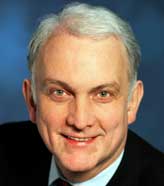Over the next three years, the IT infrastructure entities of Allianz local subsidiaries throughout Western Europe will be integrated step-by-step into ASIC (Allianz Shared Infrastructure Services) which starts operations on July 1, 2007. With this, Allianz aims to further improve service quality, as well as IT security.
Allianz consolidates its IT infrastructure in Western Europe
In this interview, Friedrich Wöbking explains these developments. He is chairman of Allianz’s international IT Committee and responsible for the preparation and implementation of this project.
Allianz.com News: Dr. Wöbking, please explain to a computer layperson: what is IT infrastructure?
Friedrich Wöbking: We divide IT into two areas: development of applications (software) on one side and system operations (hardware and operating systems) on the other side. The different services of IT system operations – data center operations, network and telecommunications, desktop support and printing – make up IT infrastructure.
Why are you consolidating IT infrastructure on a European level?
Wöbking: In the past, Allianz organized this area de-centrally throughout Europe. For Western Europe, we have 26 smaller IT infrastructure entities that provide services to 15 Allianz local subsidiaries using differing technologies, products and processes.
From a corporate view, this is not very efficient: for example, we have 150 vendors in the field of network and telecommunications. In addition, the local entities have already improved their IT operations as much as they possibly can. Due to the size of the entities, however, the potential for improvement on a local basis is limited, because scale effects cannot be realized properly.

How do you plan to improve the situation?
Wöbking: Today, we have the possibilities to standardize products, processes and technologies to the point where a single IT platform can cover a multitude of requirements. This is comparable to the automotive industry where you can use one platform to build several different models.
We plan to reorganize our IT infrastructure in such a manner that we establish the best products, processes and technologies on a cross-national level. This provides a range of benefits for the local subsidiaries: we can offer them higher quality and more secure services at better prices. For the local subsidiaries, this equals a clear competitive advantage.
How will the new company be set up? What role will it have?
Wöbking: Through the foundation of ASIC, we will build an international IT service provider within Allianz that aims at becoming best in class. The customers of the new company will be 15 local Allianz subsidiaries in Western Europe. ASIC will be headquartered in Munich. All infrastructure assets of the 26 entities will transfer stepwise into the new organization.
Subject to approval of the respective official bodies, Markus T. Müller has been appointed as the company’s CTO (Chief Technology Officer) and Kurt Servatius will become its COO (Chief Operating Officer). Both will represent ASIC as co-heads. ASIC will become one of the biggest IT providers in the insurance and financial services industry.
Does this mean you plan to steer IT for the Group’s local subsidiaries out of Munich?
Wöbking: It’s not quite so easy. Munich will be established as the central location for IT hardware and thus the data center that houses all mainframes and servers of the local subsidiaries. However, the new company will also have local presences in order to provide best possible service on an individual basis. Therefore, customer-centric services such as Service Management and Project Consulting will continue to be offered locally.
Do you plan to transfer roles to an external partner?
Wöbking: Yes, an important aspect of the new IT concept is the focus on core competencies. This will result in a reduction of our vertical integration in some service areas such as network, telecommunications and desktop support. In other words, some aspects of these services are planned to be delivered by an external provider.
This is already common practice in a number of local subsidiaries and our competitors are launching similar initiatives. By drawing a Europe wide consistent line as to which services we provide ourselves and which we transfer to a partner, we will not only improve flexibility but also obtain conditions that are more favourable. This means, the new organization can focus on the part of its business that requires specific know how of the insurance- and financial-services industry.
We will select the prospective partners very carefully and pay special attention to the employment protection terms for transferring staff. We are aware of our responsibility and are therefore interested in establishing long-term relationships with providers, which enjoy a good reputation.

What does the consolidation of IT infrastructure mean for employees in these areas?
Wöbking: In the new constellation, our attractiveness as IT employer will improve further. We will offer broad development-, qualification- and exchange-programs throughout Europe. For example, we plan to establish a second, technical, career track and a certified IT seminar program covering specific technologies that match the requirements of our staff. We will also be able to offer more international functions and career opportunities than ever before.
However, if and how our employees will benefit from this depends on the individual willingness to adapt. We would prefer to recruit members from the local subsidiaries for functions that will be centralized in certain locations and this requires employees’ willingness to relocate.
There will also be options for staff that is not willing or able to relocate: the implementation period will take three years, which is ample time to find a new job in case one’s previous function is discontinued. In the European IT market, the demand for staff currently exceeds the supply. Therefore, we will also set up an employee retention program during the change process. As you can see, even though we will reduce a limited number of jobs, layoffs are not the focus of our activities.
Will the changes in IT infrastructure have an effect on the average IT user at Allianz Group?
Wöbking: For the IT user at Allianz nothing changes as long as applications do not change. This is an over-simplified view but let me explain the situation with an example. Let us take again the field of network and telecommunications. Ten years ago, it would have been impossible for a user in the Netherlands to use computing capacity in Munich without significant time delay. The transmission rates within the networks were simply insufficient. Today, broadband technology is standard which is already in use in some parts of Allianz.
Successful models for international cooperation already exist: for example, the consolidation of mainframes from Allianz Netherlands, Austria and Suisse by Allianz’s internal IT service provider in Germany, AGIS.
Our project will be successful if the IT users do not notice a change; or if they do notice a difference it will be that ordering a new PC for instance becomes simpler, the internet works faster or some applications operate even more reliable.
As with all content published on this site these statements are subject to our Forward Looking Statement disclaimer, provided on the right.